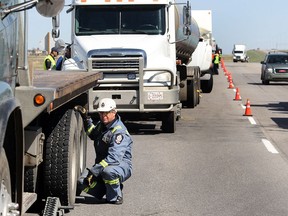Province cracking down on 'fraudulent behaviour' in Alberta's trucking industry: DreeshenTransportation Minister Devin Dreeshen said the province has shut down five driving schools and 13 trucking companies
Published Oct 03, 2025
Last updated 21 hours ago4 minute read
 Commercial trucks are inspected during a checkstop on Stoney Trail S.E. in Calgary in 2011.Postmedia file photo Commercial trucks are inspected during a checkstop on Stoney Trail S.E. in Calgary in 2011.Postmedia file photo
The Alberta government says it has shut down five training schools and taken several other steps to crack down on unsafe practices and bad actors in the commercial trucking sector.
Transportation Minister Devin Dreeshen said a series of investigations, inspections and audits over the past six months uncovered “fraudulent behaviour” in the industry, leading to these latest actions.
“Our department has actually had five trucking schools close, we’ve actually cancelled their licenses to be able to operate, and we’ve also cancelled 13 truck (companies) in the province,” Dreeshen said in an announcement Friday.
Headline News
Get the latest headlines, breaking news and columns.
By signing up you consent to receive the above newsletter from Postmedia Network Inc.
Additional measures include 39 disciplinary letters, more than $100,000 in administrative penalties, the revocation of 12 instructor licenses and four warnings sent to driver examiners.
The investigations were conducted by the Driver Training and Oversight Unit, which investigated complaints, audits, and blanket investigations on where to find the bad actors in the province’s trucking industry.
“A lot of it was fraudulent behaviour, so there were tests that were incomplete, or tests that were forged,” Dreeshen said. “Drivers weren’t getting the proper training, even though they were saying that they were, and a lot of that was complaint-based.
“That’s when the audits would go in (and) they would go in and do an investigation on the practice done there.”
The 13 trucking companies were ordered to shut down over issues ranging from poor on-road performance to failure to meet safety standards.
“Others were ‘chameleon carriers’ as well,” he said. “There would be a trucking company that is trying to relocate and rename themselves, that maybe had their licenses cancelled in another province, so they move into Alberta and essentially hope to get away with the bad performance and leave their bad record behind.
“Some of them were those ‘chameleon carriers’ — issues where, through work with other provinces, we found out they had their licenses cancelled in other provinces, and we shut them down.”
 Transportation Minister Devin Dreeshen. Brent Calver/Postmedia Transportation Minister Devin Dreeshen. Brent Calver/Postmedia
Denton Dafoe, a 20-year truck driving veteran, said both he and long-time truck drivers in Alberta have noticed a steady decline in the quality of Class-1 operators.
This advertisement has not loaded yet, but your article continues below.
“We knew about these schools existed, and I’m a supervisor, so I do a lot of these test drives for new drivers that we hire, and some of the drivers that have their Class-1, the quality of their driving has been very, very poor,” Dafoe said. “Just after the incident in Humboldt, I had a conversation with another longtime truck driver who had noticed the same trend as me. It’s sad to say, but we weren’t surprised.
“We were seeing that the quality of truck driving, and I don’t know if it came from schools or how it came about, but the quality of driving itself has gotten so poor, that we were almost expecting a major incident like that to happen.”
Next in the government’s sights is a misclassified drivers scheme called “Drivers Inc.,” where companies hire independent contractors to avoid payroll taxes and benefits.
These drivers lack the proper training and oversight, and are often exploited, Dreeshen said.
In July, a week-long commercial driver status and classification check stop found 20 per cent of 195 drivers were suspected of being misclassified.
Several were also temporary foreign workers.
“This is something that I’ve raised at our Federal Provincial Territorial Transportation meetings in the past,” Dreeshen said. “The federal government, as well as the provinces, need a better line of sight on allowing these types of drivers to operate through Drivers Inc. or chameleon carriers, whether it’s a bad Alberta company setting up shop, or a bad trucking company from another province moving into Alberta.”
Next on the docket, Dreeshen said he plans to look into TFW’s, which he says are similar to the H2B visas in the United States.
“That’s something we are working with our immigration ministry here in the province, as well to make sure we have a better line of sight on if there are issues there as well,” Dreeshen said. “And obviously English proficiency is something you need to get a Class-1 license in Alberta.
“. . . So, to make sure that, that is all well understood and is being properly used and followed in the province is something our investigative teams are looking into.”
Dafoe said while the government-mandated MELT program was a step in the right direction, it didn’t grandfather all the people who already had their licenses.
“It didn’t take the people that were unsafe or who suspiciously got their licenses from the schools that got shut down were not then retested,” Dafoe said. “So, how ever many years this driving school was producing all of these phony Class 1’s, they’re still on the road.”
Dafoe said at least the province is finally taking action on these drivers.
“My biggest problem before Humboldt, there was no focus on it,” Dafoe said. “The government didn’t care, they weren’t doing anything, and they were just pumping out drivers so that they can keep freight costs cheap and drivers wages down.
“. . . But then an incident like Humboldt happened, and then they started focusing on it. Unfortunately it wasn’t proactive, but it was reactive, and they’re actually doing something about it.” |





 Commercial trucks are inspected during a checkstop on Stoney Trail S.E. in Calgary in 2011.Postmedia file photo
Commercial trucks are inspected during a checkstop on Stoney Trail S.E. in Calgary in 2011.Postmedia file photo Transportation Minister Devin Dreeshen. Brent Calver/Postmedia
Transportation Minister Devin Dreeshen. Brent Calver/Postmedia